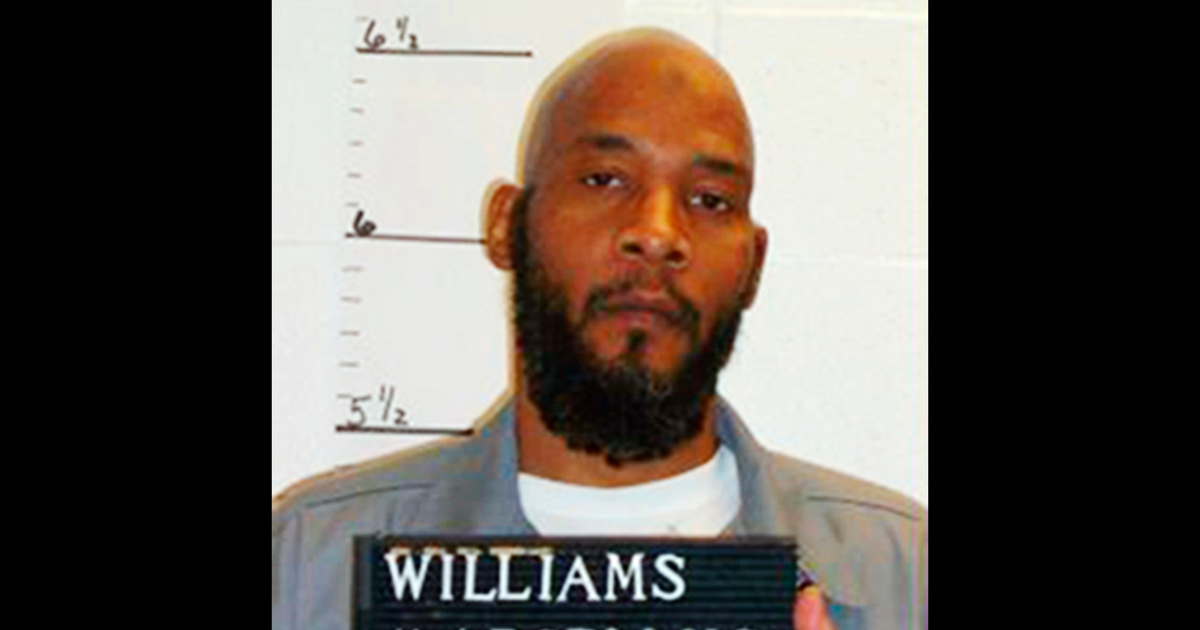CBS News
Marcellus Williams’ execution set to proceed Tuesday, Missouri Supreme Court rules

The execution of Marcellus Williams is set to proceed as scheduled Tuesday after the Missouri Supreme Court and the state’s governor both rejected pleas to halt the procedure.
An attorney for Williams argued Monday that the state Supreme Court should halt the lethal injection because a trial attorney prevented a Black man who he thought looked similar to the defendant from serving on the jury. Williams is scheduled to be executed at 6 p.m. on Tuesday for the 1998 stabbing death of Lisha Gayle in the St. Louis suburb of University City.
Williams, 55, has asserted his innocence. But his attorney did not pursue that claim Monday before the state’s highest court, instead focusing on alleged procedural errors in jury selection and the prosecution’s alleged mishandling of the murder weapon.
The state Supreme Court should “correct an injustice” either by declaring that a prosecutor wrongly excluded a potential juror for racial reasons or by sending the case back to a lower court to determine that issue, attorney Jonathan Potts argued on behalf of Williams.
Republican Missouri Attorney General Andrew Bailey’s office has argued for the execution to proceed. The trial prosecutor has denied that he had racial motivations in removing potential jurors and did nothing improper — based on procedures at the time — by touching the murder weapon without gloves after it had already been tested by a crime lab, Assistant Attorney General Michael Spillane said in arguments to the state Supreme Court.
Attorneys for Williams also have an appeal before the U.S. Supreme Court.
Williams had also requested clemency from Republican Gov. Mike Parson, an ask that focused largely on how Gayle’s relatives want the sentence commuted to life in prison without parole. But Parson on Monday said the execution would proceed following the state Supreme Court’s ruling.
“Capital punishment cases are some of the hardest issues we have to address in the Governor’s Office, but when it comes down to it, I follow the law and trust the integrity of our judicial system,” Parson said in a statement Monday. “Mr. Williams has exhausted due process and every judicial avenue, including over 15 hearings attempting to argue his innocence and overturn his conviction. No jury nor court, including at the trial, appellate, and Supreme Court levels, have ever found merit in Mr. Williams’ innocence claims. At the end of the day, his guilty verdict and sentence of capital punishment were upheld. Nothing from the real facts of this case have led me to believe in Mr. Williams’ innocence, as such, Mr. Williams’ punishment will be carried out as ordered by the Supreme Court.”
The NAACP had also urged Parson to stop the execution.
The execution would be the third in Missouri this year and the 100th since the state resumed executions in 1989.
Williams was less than a week away from execution in January 2015 when the state Supreme Court called it off, allowing time for his attorneys to pursue additional DNA testing.
He was just hours away from being executed in August 2017 when then-Gov. Eric Greitens, a Republican, granted a stay after reviewing DNA evidence that found no trace of Williams’ DNA on the knife used in the killing. Greitens appointed a panel of retired judges to examine the case, but the governor stepped down over an unrelated scandal and that panel never reached a conclusion.
Questions about DNA evidence also led Democratic St. Louis County Prosecuting Attorney Wesley Bell to request a hearing challenging Williams’ guilt. But days before the Aug. 21 hearing, new testing showed that the DNA evidence was spoiled because members of the prosecutor’s office touched the knife without gloves before the original trial.
With the DNA evidence unavailable, Midwest Innocence Project attorneys reached a compromise with the prosecutor’s office: Williams would enter a new, no-contest plea to first-degree murder in exchange for a new sentence of life in prison without parole.
Judge Bruce Hilton signed off on the agreement, as did Gayle’s family. But at Bailey’s urging, the Missouri Supreme Court blocked the agreement and ordered Hilton to proceed with an evidentiary hearing, which took place Aug. 28.
Hilton ruled on Sept. 12 that the first-degree murder conviction and death sentence would stand, noting that his arguments all had been previously rejected.
“There is no basis for a court to find that Williams is innocent, and no court has made such a finding,” Hilton wrote.
On Tuesday, Williams’ attorney argued that circumstances are different, because the trial prosecutor had not previously been questioned in court by Williams’ attorney about the reason he removed a specific juror.
The prosecutor in the 2001 first-degree murder case, Keith Larner, testified at the August hearing that the trial jury was fair, even though it included just one Black member on the panel. Larner said he struck one potential Black juror partly because he looked too much like Williams. He didn’t explain why he felt that mattered.
The clemency petition from the Midwest Innocence Project focuses heavily on how Gayle’s relatives want the sentence commuted to life without parole. Parson, a former sheriff, has been in office for 11 executions, and has never granted clemency.
Prosecutors at Williams’ original trial said he broke into Gayle’s home on Aug. 11, 1998, heard water running in the shower, and found a large butcher knife. Gayle, a social worker and former reporter for the St. Louis Post-Dispatch, was stabbed 43 times when she came downstairs. Her purse and her husband’s laptop computer were stolen.
Authorities said Williams stole a jacket to conceal blood on his shirt. Williams’ girlfriend asked him why he would wear a jacket on a hot day. The girlfriend said she later saw the purse and laptop in his car and that Williams sold the computer a day or two later. Police have said they found Gayle’s clothing and the computer in Williams’ car.
Prosecutors also cited testimony from Henry Cole, who shared a cell with Williams in 1999 while Williams was jailed on unrelated charges. Cole told prosecutors Williams confessed to the killing and offered details about it.
Williams’ attorneys responded that the girlfriend and Cole were both convicted of felonies and wanted a $10,000 reward. Parson on Monday said in a statement the girlfriend “never requested the reward for information.”
CBS News
More than a century after their land was ravaged by the California gold rush, Yurok tribe to reclaim land near Redwood National and State Parks

Rosie Clayburn is a descendant of the Yurok Tribe, which had its territory — called ‘O Rew in the Yurok language — ripped from them nearly two centuries ago.
“As the natural world became completely decimated, so did the Yurok people,” she said.
That decimation started when miners rushed in for gold, killing and displacing tens of thousands of Native Americans in California and ravaging the redwood trees for lumber.
“Everything was extracted that was marketable,” Clayburn said. “We’ve always had this really intricate relationship with the landscape. We’ve hunted, we’ve fished, we’ve gathered. And those are all management tools. Everything that we do has been in balance with the natural world.”
Now, generations later, 125 acres bordering Redwood National and State Parks will be handed back to the Yuroks.
The nonprofit Save the Redwoods League purchased the land in 2013 from an old timber mill, with the original goal of giving it to the National Park Service.
“As we continued conversations about the transfer of this land to the National Park Service, we began to realize that perhaps a better alternative would be to transfer the land back to the Yurok Tribe,” said Save the Redwoods League’s Paul Ringgold. “No one knows this land better. They’ve been stewarding this land since time and memorial”
Ringgold said that stewardship includes controlled burns to clear dead vegetation — a native practice once outlawed, but now recognized as essential in preventing catastrophic wildfires.
“Indigenous populations have been using fire as a management tool,” he said. “We’d like to see that kind of practice return.”
Redwoods serve as some of the largest stores of carbon on the planet. A single tree can capture up to 250 tons in its lifetime, the equivalent of removing nearly 200 cars from the road for an entire year.
But between logging and fires, 95% of California’s redwoods have been destroyed. Over the past decade, the Yurok have been helping restore the land.
Another forgotten jewel of the ecosystem is salmon. The fish were once so plentiful, they were eaten with most meals. The Yurok word for salmon even translates to “that which we eat.” But the salmon population has dwindled to about one-quarter of what it was 20 years ago, according to a coalition of state and federal agencies.
The tribe is working to bolster the fish’s population by building a stream channel, two connected ponds and about 20 acres of floodplain.
“You have salmon who provide for humans, but they also provide for other animals,” Clayburn said. “And then when they spawn and die, they put nutrients back in the ground. And so, everything just has this, this balance and this reciprocal way.”
That balance is returning. There’s been a rebound in the salmon population and the Yuroks also recently reintroduced the California condor — a scavenger that’s important to the ecosystem — back into the wild for the first time this century.
“It tells us that our land’s healing and that our people are gonna heal,” Clayburn said.
The Yuroks will take full control of ‘O Rew in 2026 and, in a first-of-its-kind partnership, receive help managing it from the Save the Redwoods League, California State Parks and The National Park Service.
“We understand some of the mistakes we made as a federal government, and it’s a chance to begin that healing with the native tribes all across the United States,” said National Park Service Director Chuck Sams.
For Sams, the first Native American to lead the agency, the partnership is personal.
“We’ve been writing our histories separately. There’s been the native history and then the American history. This is a chance when we’re doing co-stewardship and co-management to write history together,” he said.
Of the 431 parks managed by the National Park Service, 109 of them now have formal co-stewardship agreements with indigenous tribes, with 43 more on the way.
In addition to restoration work, plans for ‘O Rew include the creation of new trails, the construction of a traditional Yurok village and a state-of-the-art visitor center. The visitor center will display Yurok artifacts and highlight the tribe’s history and culture, with the goal of educating new visitors on the land’s history and significance from the perspective of those who have lived on it the longest.
“I really hope ‘O Rew symbolizes a coming home of the Yurok people and reconnecting with our landscape,” said Clayburn.
CBS News
“CBS Evening News” headlines for Monday, Dec. 16, 2024

Watch CBS News
Be the first to know
Get browser notifications for breaking news, live events, and exclusive reporting.
CBS News
New York judge rejects Trump presidential immunity claim in “hush money” case

President-elect Donald Trump’s criminal conviction in state court remains on the books Monday, after a New York judge rejected an effort by Trump to have the case tossed based on a landmark Supreme Court ruling.
Justice Juan Merchan found that a July Supreme Court ruling granting Trump presidential immunity for official acts did not preclude a jury from finding him guilty after a criminal trial this spring.
Merchan wrote that evidence shown at trial pertained “entirely to unofficial conduct.”
This is a developing story and will be updated.









